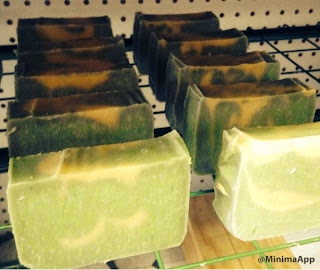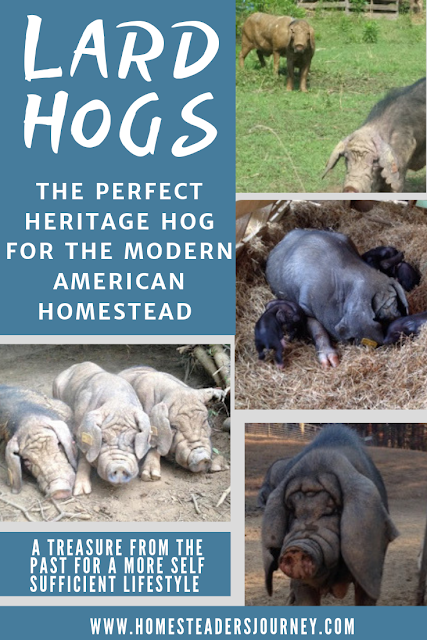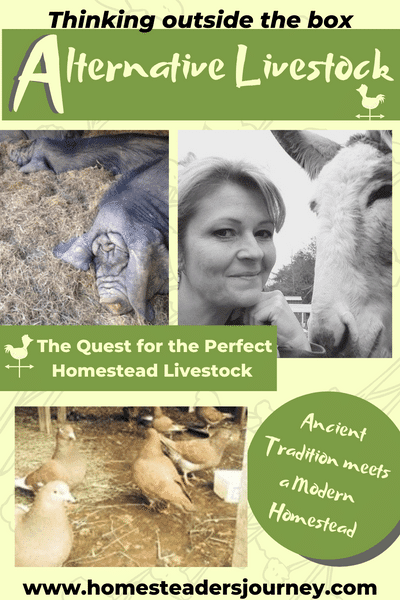What was old is new again! Heritage lard hogs are quickly becoming more popular on small farms again! For their excellent red meat pork and silky lard, they are niche pigs with great potential!
Heritage 'unimproved' Hogs
The picture you see above was a drawing in a book my wife found in a used book store. She loves to find "old school " wisdom in out of print books!
The drawing depicts a typical "Red Berkshire Hog" circa 1881. To keep that date in perspective America was only 16 years removed from General Robert E Lees surrender at Appomattox (still a dark day to my beautiful southern-born wife) and only five years from George Armstrong Custer's defeat at the Little Big Horn. So we were not talking about a feed store grain fattened hog here.
The Book The Compleat Farmer was compiled in 1975 and was a collection of reprints from the periodical "American Agriculturist" (established 1842) spanning over 50 years of its publication.
As a former breeder of American Guinea Hogs and now Meishan Pigs, both 'lard' hogs, I was very struck by the portly profile of the Berkshire pictured above. He looked way more like the America Guinea Hogs I used to raise than the common "improved" carcass hogs I have grown all to used to seeing.
While Berkshires are the oldest registered hog breed and today are constantly referred to as a "heritage breed" I was struck that I never recalled them looking so short legged or frankly so fat. So I did a Google Search on "Berkshire Images". What I found confirmed my initial recollections.
The Modern American Hog
Yes, this is a very representative image of what I found. Hmm, obviously something had happened between The Little Big Horn and today's "New White Meat". But this blog post isn't about the Berkshire Hog. Today it is still touted as one of the most popular breeds to cross with commercial breeds to increase the intramuscular fat content and improve the dry wallboard texture (my opinion not a stated industry standard) of most commercial pork. I will assume it has become what its breeders, and what livestock show( 4H, FFA, County Fair, etc) judges wanted them to become. I do chuckle when its touted as a hog representing its "original" heritage, however.
The Lard Hogs Role On a Homestead
No, this post is about the role of the heritage lard hog on older small holding farmer operations and if that role is still applicable today in the "modern" homestead. How that traditional role affected its growth rate, fat to meat ratio and final size requires understanding its role on those farms. And if those traits, if retained, can make it an ideal addition to the modern small homesteader. Also, a fuller understanding of what the lard hog was and it will help us as lard hog breeders to celebrate and maintain the breed in its true "heritage" form.
In the discussion of the "old time" southern homestead, I have a unique and rich resource to get impressions of what role the farm pig played in smallholder operations. My wife was raised on a 100-acre farm in Athens TN. More importantly, she grew up knowing not only her grandparents but two of her great grandmothers. This was a resource that stretched back to early 1900s and before. Their impressions and statements have been very revealing in the search to define the role of the "pig" was on their farms. Her two branches of the farming family tree were a bit different. Her one paternal great grandmother owned 100 acres of rich creek bottom land. That grandfather raised cattle, had raised hogs, raised hay, grew all of his finishing grain (corn) and had large gardens both with cash crops and home usage crops. He had a smokehouse, corn crib, and a full working sawmill to utilize his woodlots. In addition to all those endeavors, he held down a full-time job at the postal service.
Her maternal great grandmother was a Cherokee Indian (whose family refused to report to the reservation) who owned 80 acres of a rocky mountaintop. She bought calves and raised them for sale(never eating something so valuable herself) and raised a feeder pig which she fed with the table scraps she was allowed to bring home from her waitress job in a local diner. Ironically in those times, the 80 acres and 100-acre farm were considered small (or medium at best) farm operations of that day. I think both farms were very representative of post-depression smallholders in the southeast.
Farming was a big part of their income but after the economic devastation of the depression not deemed reliable enough to be the sole source of income. These people had an incredible work ethic to work and farm at these scales. Every family member had their role right down to the pre-teens. My wife's grandmother commented the other day "Your grandfather wore me out over THOSE gardens!".
The pig in those situations was bought as an early feeder in the spring. It was raised on pasture and its omnivorous nature made it the perfect garbage disposal when kitchen garbage was more likely to be pumpkin rinds and chicken entrails than plastic wrappers. Corn was reserved for late finishing of both the cattle and the hogs so the pigs had to be able to forage and live through lean times and thrive and fatten in better.
Every year like clockwork the day after Thanksgiving the hogs were slaughtered. This was done then because typically the onset of cooler weather in the southeast lent itself for less risk of spoilage and contamination of the meat and fat. It also signaled the end of rich pasture and in those days overwintering a feeder animal was a fool's exercise. The next day the families women (of all ages) gathered to render the fats into lard. That lard had the wonderful trait of being able to be stored without refrigeration. And refrigeration capacity was in short supply or nonexistent in those days. Too much meat was more difficult to cure and waste was not an option. That precious lard was put into Mason jars and sent to the root cellars of the household. That lard would be the cooking oil and baking shortening for the entire next year. Olive oil was in Italy not the home farms of Tennessee.
 |
| Meishan Pig, The perfect Lard hog for us |
The cracklins that remained were fried crispy and devoured like modern junk food or put into cornbread. Some pork was consumed on the spot and the rest was sent to the smokehouse where it was smoked for the preservation not just for flavor. In fact, in those days the homestead hog was a dual-use animal. Those purposes were as a source of meat and FAT. It can be argued that the hogs ability to produce a storable fat source was even more important than its role as a meat source in a culture that was more likely to dine on a pot of beans than a cut of meat.
So in review, the ideal 'farm hog" would grow to butcher size (typically 150-200 lbs) in 8-10 months and would easily add back fat and lard without graining. It had to be docile and for those retained for overwintering and breeding a medium size. Raising a feeder hog had many advantages. When you look at that farming model you can see why the American Guinea Hog, as a lard hog, became the most popular hog in the southeast. And why the Meishan, also a lard hog, was so prized in China!
The Modern Breeding of 'lean' Pork
 |
| Meishan Pork Roast |
Flash forward 80-100 years. The 80 hours work week smallholder has given way to a society returning from World War II and Korea that invented the subdivision and found the reliability of the factory paycheck much more attractive than the grind(not the "simple life as some romanticize it today or in 1975 )of farm life. Those households found the chest freezer as readily available as the telephone or the light bulb. This society needed cheap quick and convenient food sources. Those farmers who stay behind on their acreages found it more profitable to focus on fast-growing cash crop hogs and use the additional money to fill their other homestead needs at these new "Supermarkets" popping up in even small towns.
Lard? Well, that was quickly replaced by margarine and Crisco heralded by Government as a superior "healthier alternative". And quickly the medium lard hog like the Guinea Hog was an anachronism.
Unable to be "improved" to modern standards and USDA grading systems which put the highest price on pork with the "leanest" qualities. Lard hogs fell out of favor and dangerously close to extinction.
Today lard hogs like the Meishan are enjoying a remarkable resurgence! But even as the new "homesteaders" and those who seek to become genetic repositories for the breed begin to acquire these pigs I fear that we are losing sight of the true "heritage" of the heritage hog.
Don't raise a Lard breed if you want Lean Pork!
As new farmers and breeders from a fat averse society obtain the breeds like the Meishan I am always struck by those who try to breed and grow the Meishan or other lard breeds as "lean". That wring their hands over how quickly they become "rotund". I am already seeing AGH bloodlines which look more like the second picture above and not the first. You see being "rolly polly" is their heritage. They are LARD hogs. There are few true lard type hogs remaining. They were raised and bred to easily add precious fat, be ready for slaughter in 9-10 months, be docile enough to be a "yard pig", not attack your chickens or your children!
To raise the hog so as to minimize fat, accept growth rates ( or to make inadequate pasture or supplemental feed available) that result in pigs that take over 12 months (some up to 2 years!) to reach 100lbs is not the preservation of the heritage of the breed. Its just maintaining human-modified gene pool. But as I make this case understand I am not a museum farmer. I do not keep animals on my farm simply because they are "heritage".I do not begrudge those who do. But my animals must be low input animals that provide excellent efficiencies in both growth and utilization.
No hog fits that better for my farm than the Meishan as a TRUE lard hog.
Other posts about Meishans and how they improved our farm
Lard helps us achieve a Self Sufficient Homestead
We celebrate and render the fats. The succulent and sweet fat makes the meat superior to what we can find from Krogers to Whole Foods. The reasonable(if slower than some breeds) growth rate of 9-11 months to `150# plus weights fits into our plans to butcher our own hogs in the fall and to smoke and can their meats in cool weather. For our application the Meishan is not heritage, it is superior.
 |
| Lard Soap |
My wife utilizes those lards along with other farm-raised products to produce an entire skin care line including soaps, lotions, and shampoo bars. We no longer buy cooking oils or butter as we bake, cook and fry in lard. We would be lost when faced with a "lean hog".So before we as a community lose these qualities I would refer you to a quote from the introduction of The Compleat Farmer:
"The Compleat Farmer is an indispensable guide to good country living. It is, as its subtitle suggests, "a compendium of do-it-yourself, tried and true practices for the farm, garden, and household"
But it is more than that. It is the sage sound salient advice of the nineteenth-century American farmer and his wife, selected, edited, and arranged for its practical use today.....these serviceable, interesting ideas from America's past speak directly to America's present. All are immediately applicable to a society bogged down with energy and cost problems, wanting to cut back, wanting to live a simpler less costly life, but not knowing how or where to begin"
Those words were written 40 years ago in 1975. I would argue the simple life those evenings I work past dark and peel off my manure stain jeans. But there is much wisdom in those old small farming methods. Do they ring true for you too? In closing, I offer that if you choose to raise a Guinea Hog, Mule foot or a Meishan always consider raising it true to its "heritage".
For if you do and if you learn to treasure and celebrate those wonderful fats its value to you will be more than just a museum piece. It will be an indispensable part of your homestead and possibly a niche business as the fats are becoming trendy amount certain healthy dieters as well as for high dollar charcuterie plates.
 |
| American Guinea Hog |
Heritage Hog Breeds
For more info on Heritage hog breeds, including lard breeds check out the Livestock Conservancy
You can also check out the American Meishan Breeders Association
and the Gods Blessing Farm Meishan Pigs
If you want to know even more about Meishan pigs and how they are the perfect homestead pig for us and our homestead business you can sign up for the list for regular updates on the breed and the press its been getting!
















